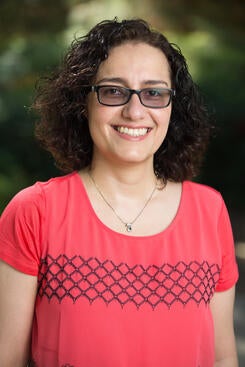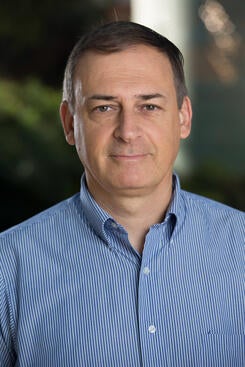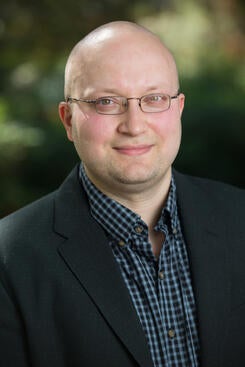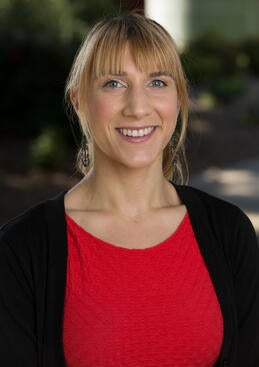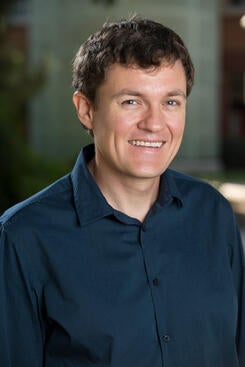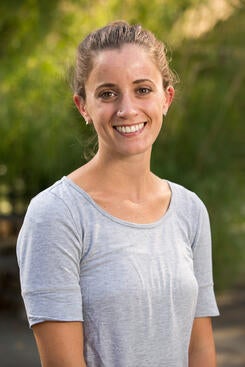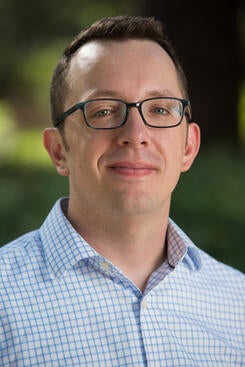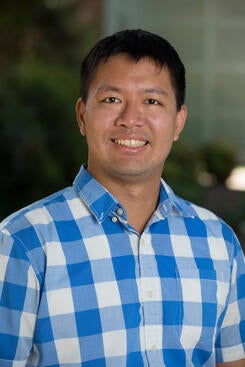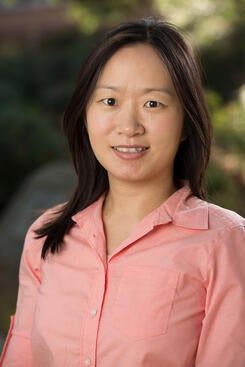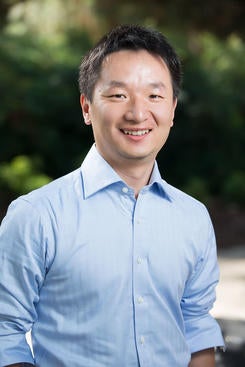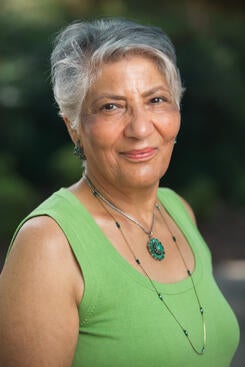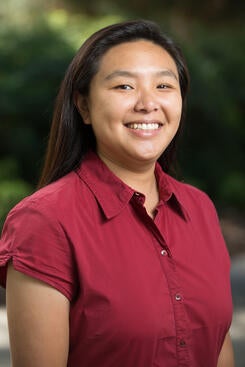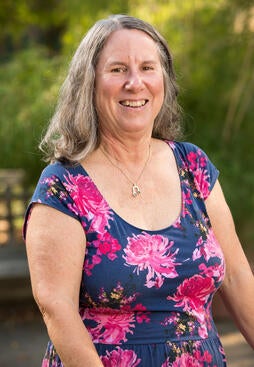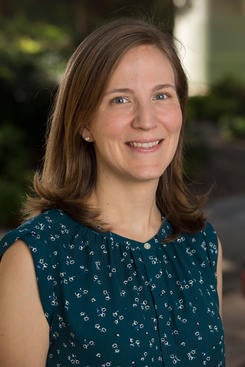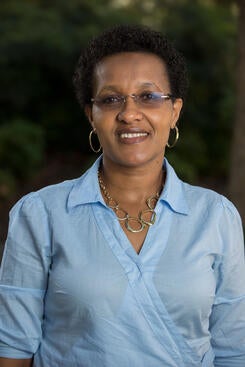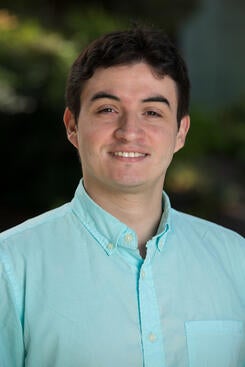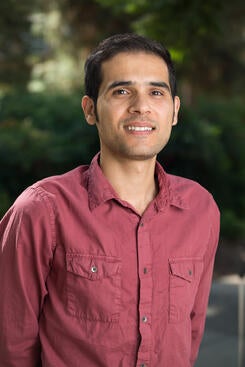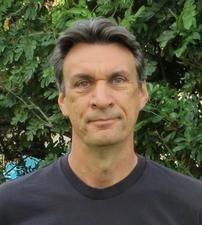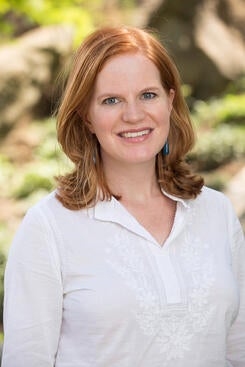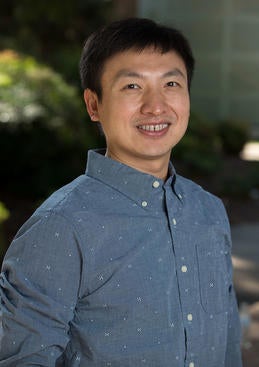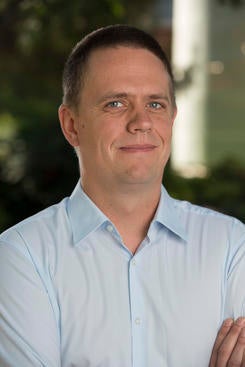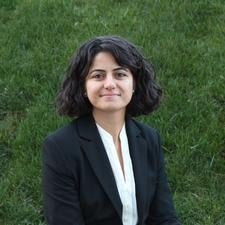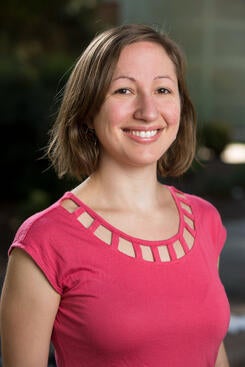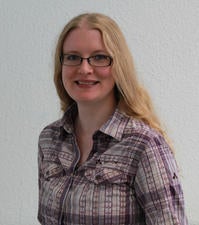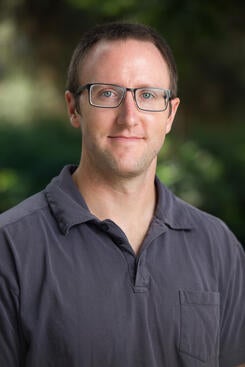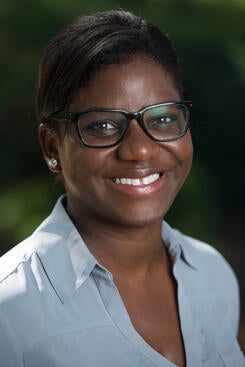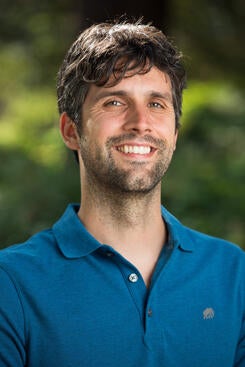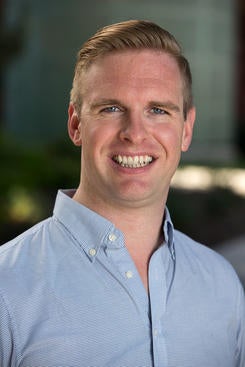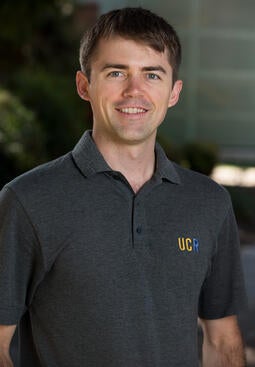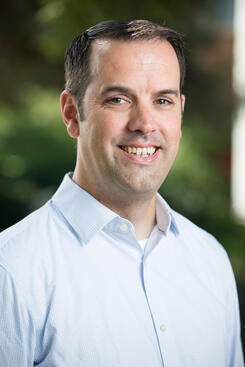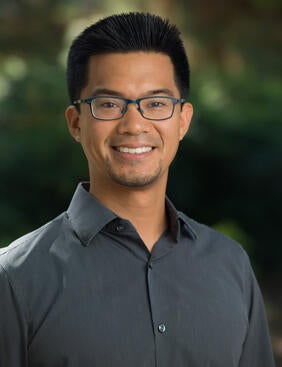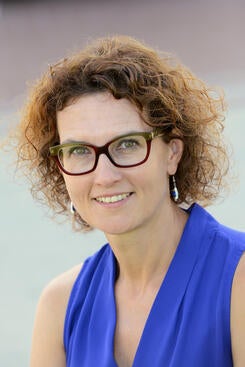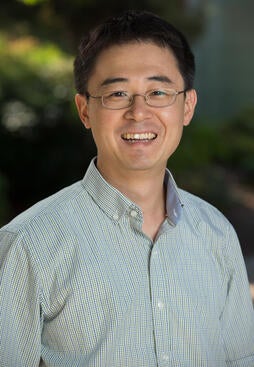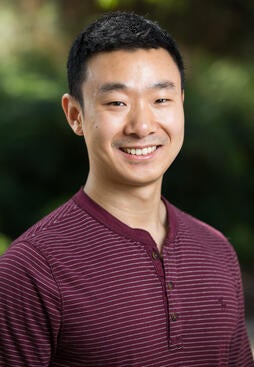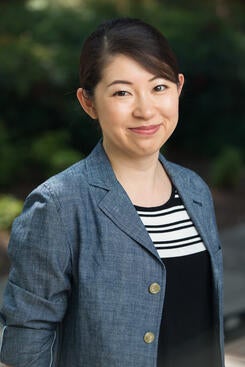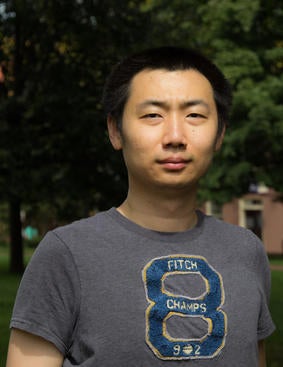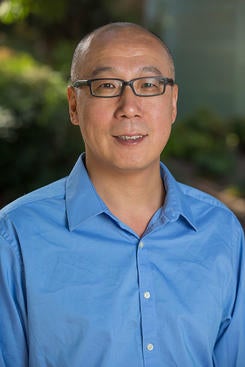
Please view short biographies and portraits of our new faculty members and the new dean. Welcome!
Hoori Ajami
Hoori Ajami, assistant professor of groundwater hydrology in the Department of Environmental Sciences, earned her Ph.D. in hydrology at University of Arizona. Her research interests are in the areas of catchment hydrology, groundwater recharge, surface water-groundwater interactions, distributed hydrologic modeling, and geographic information science. She works on the development and implementation of computationally efficient methods for hydrologic modeling, climate change impact assessments on terrestrial hydrologic processes and ecohydrology at a catchment to regional scales.
Mark Alber
Mark Alber, distinguished professor of mathematics in the Department of Mathematics, earned his Ph.D. in mathematics at University of Pennsylvania His research interests include computational and mathematical biology, biophysics, applied mathematics, multi-scale modeling and mathematical physics. In particular, he works on the development and computational implementation of multi-scale models of biological processes involved in early development, blood clotting, microtubule dynamics and bacterial swarming. He was elected a fellow of the American Association for the Advancement of Science (AAAS) in 2011. He is currently a deputy editor of the PloS Computational Biology and associate editor of the Bulletin of Mathematical Biology. He is also section editor of the Encyclopedia of Applied and Computational Mathematics recently published by Springer.
Igor Barsukov
Igor Barsukov, assistant professor in the Department of Physics and Astronomy, earned his Ph.D. in physics at the University Duisburg-Essen in Germany. His research interests are in the area of experimental condensed matter physics. His lab designs magnetic nanoscale devices and studies spin dynamics and spin transport using microwave/terahertz spectroscopy. The goal of this research is to provide a better understanding of magnon-phonon interaction and to develop energy-efficient spintronics applications.
Holly Bik
Holly Bik, assistant professor of nematology in the Department of Nematology, earned her Ph.D. in molecular biology at the University of Southampton in the United Kingdom. Her interdisciplinary research interests span a number of scientific fields, including taxonomy, ecology, genomics, computational biology, and data visualization. Her work uses high-throughput DNA sequencing and
-Omics approaches to explore broad patterns in microbial eukaryote assemblages (biodiversity and phylogeography, functional roles for microbial taxa, and the relationship between species and environmental parameters), with an emphasis on free-living nematodes in marine sediments.
Alan Brelsford
Alan Brelsford, assistant professor of evolutionary genomics in the Department of Biology, earned his Ph.D. in zoology at University of British Columbia. His interests include the genetic basis of speciation, behavior, and sex determination in animals such as amphibians, birds, and insects. His research program integrates field, laboratory, and computational methods.
Maryjo Brounce
Maryjo Brounce, assistant professor of petrology in the Department of Earth Sciences, earned her Ph.D. in oceanography at the University of Rhode Island Graduate School of Oceanography. Her research interests are focused on understanding the composition and structure of the Earth, with a focus on chemical exchange between the deep interior, the crust, and the atmosphere and oceans of Earth. She uses both land and oceanographic field studies, combined with a variety of analytical and experimental tools to probe the composition of sediments and volcanic rocks to place constraints on mechanisms of plate tectonic processes and their impact on the evolution of the composition and structure of Earth on a variety of timescales.
Matt Casselman
Matt Casselman, lecturer with potential security of employment in the Department of Chemistry, earned his Ph.D. in organic chemistry from Purdue University in 2013. His research background is in organic synthesis and organic materials for energy storage applications. He currently focuses on chemical education and is developing student-centered active-learning opportunities for use in the organic chemistry course sequence at UCR.
Po-Ning Chen
Po-Ning Chen, assistant professor of mathematics in the Department of Mathematics, earned his Ph.D. in mathematics at Harvard University. His research interests are in the areas of differential geometry and mathematical general relativity. He works on problems arising from general relativity and mathematical physics using the ideas and techniques from geometric analysis and partial differential equations.
Yanou Cui
Yanou Cui, assistant professor of physics in the Department of Physics and Astronomy, earned her Ph.D. in physics at the University of Michigan-Ann Arbor. Her research interests are in the area of theoretical high energy physics, including elementary particle physics and its interface with cosmology/astrophysics. She works on theoretical model-building addressing outstanding questions such as the hierarchy problem, dark matter and the origin of matter anti-matter asymmetry. Her work also concerns the experimental probes of new particle physics at various frontier experiments such as the Large Hadron Collider, dark matter detectors, neutrino experiments and cosmic microwave background observatories.
Yongtao Cui
Yongtao Cui, assistant professor in the Department of Physics and Astronomy, earned his Ph.D. degree in applied physics at Cornell University. His research interests focus on study of quantum materials which exhibit unusual electronic properties. These material properties provide opportunities to develop next-generation electronic devices. He employs a variety of experimental techniques to probe the electric and magnetic properties of these materials at nanoscale, which aims to understand the underlying physics that could help improve their performance as well as discover new types of materials.
Katayoon (Katie) Dehesh
Katayoon (Katie) Dehesh, professor and director of the Institute of Integrative Genome Biology, earned her Ph.D. in stress biology at Sussex University, UK. Her interests are in deciphering the molecular and biochemical regulatory mechanisms underlying stress-induced responses that have a central and evolutionarily-conserved role in organismal integrity and adaptation to prevailing environmental conditions. Specifically, she examines how stress signals are sensed, and the mechanisms by which they integrate targeted processes, that collectively culminate in organellar cooperativity, a phenomenon that is an evolutionary necessity for maintenance of cellular homoeostasis. She employs plants as a platform to unravel the signaling network(s) shared by various organisms, to provide an integrated view of the origins and patterns of divergence in adaptive signaling networks.
Stephanie Dingwall
Stephanie Dingwall, professor of teaching in biochemistry, earned her Ph.D. in biochemistry and molecular biology at the University of California, Riverside. Her research is focused on the spectrophotometric and kinetic characterization of molybdenum-containing enzymes, employing methods including electron paramagnetic resonance spectroscopy, UV-visible spectroscopy, and rapid-reaction and steady state kinetic assays. As a former community college adjunct instructor, she taught courses ranging from biology and chemistry for non-majors to microbiology for pre-allied health students. Having been a teaching assistant at UCR, she is looking forward to continue working with students at the university.
Marilyn L. Fogel
Marilyn L. Fogel, Wilbur W. Mayhew Professor of Geoecology and the EDGE Institute Director (Environmental Dynamics and Geo-Ecology) in the Earth Science and Environmental Science departments, earned her Ph.D. in botany (marine science) at the University of Texas, Austin. Her interests include cycling of elements in modern and paleo-ecosystems, astrobiology, and stable isotope biogeochemistry. She was elected fellow of the Geochemical Society in 2003. In 2013, she was elected fellow of the AAAS and was awarded the Treibs Medal in Organic Geochemistry. She is currently serving as the president of the Biogeosciences section of the American Geophysical Union.
Heather Ford
Heather Ford, assistant professor of seismology in the Department of Earth Sciences, earned her Ph.D. in geophysics at Brown University. Her research is focused on understanding the physical and chemical properties, structure and dynamics of the Earth’s crust and mantle using passive source seismic imaging techniques. She specializes on problems related to the formation and evolution of the continental lithosphere with an emphasis on stable continental interiors, active transform plate boundaries, and regions of extension.
Emma Gachomo
Emma Gachomo, assistant professor of plant pathology and microbiology in the Department of Plant Pathology and Microbiology, earned her Ph.D. in Plant Pathology at University of Bonn, Germany. Her research interests are in the areas of plant disease development, soil ecology, microbial ecology, biological control and analytical chemistry. Her work focuses on understanding microbes-microbes interactions and plant-microbe interactions with purposes of improving plant health and productivity.
Jose Gonzalez
Jose Gonzalez, assistant professor of mathematics, earned his Ph.D. in mathematics at the University of Michigan. His research is in algebraic geometry, a central and highly active branch of mathematics. Algebraic geometers study algebraic varieties, which are geometric objects locally given as the solutions to polynomial equations. Algebraic geometry has interactions with most areas of mathematics and it has practical applications to theoretical physics, engineering and computer science. He is broadly interested in algebraic geometry and its interactions with combinatorics, topology and commutative algebra. The central themes of his research are toric geometry, intersection theory and birational geometry. Part of his work is based on the use of combinatorial techniques to investigate concrete questions about varieties that admit the action of an algebraic torus. He has also helped developing concrete aspects of the theory of algebraic cobordism. He has also investigated the algebras called Cox rings using diverse techniques to decide their finite generation.
Amir Haghverdi
Amir Haghverdi, assistant CE specialist/scientist, earned his Ph.D. degrees in irrigation engineering and biosystems engineering at Ferdowsi University of Mashahd and University of Tennessee-Knoxville, respectively. His research at UCR is on urban water management with irrigation engineering, soil hydrology, and precision farming as the main themes. He is interested in applications of advanced data acquisition and mining techniques including remote sensing, GIS and GPS technologies, machine learning and wireless sensors in his research activities. Amir’s goal is to establish an integrated research-extension program that incorporates computer modeling and laboratory/field experiments.
Frederick Hamann
Frederick Hamann, professor in the Department of Physics and Astronomy, earned his B.S. in astronomy-physics and B.S. in mathematics from the University of Wisconsin and his Ph.D. in astronomy from the State University New York at Stony Brook. His research interests are in astrophysics, specifically quasars and active galaxies, super-massive black holes in galactic nuclei, the formation and evolution of galaxies, accretion and outflow processes in stars and galactic hole environments, the high redshift universe, galactic chemical enrichment, early and late stages of stellar evolution, and spectroscopy with astrophysical applications.
Francesca Hopkins
Francesca Hopkins, assistant professor of climate change and sustainability in the Department of Environmental Sciences, earned her Ph.D. in earth system science from UC Irvine. She is interested in the effects of human activities on the global carbon cycle and climate from an interdisciplinary earth system science perspective. Her research seeks to identify and understand the processes the drive terrestrial carbon emissions from anthropogenic and natural sources using biogeochemical field and laboratory techniques that span the molecular to landscape scale.
Zhenyu Jia
Zhenyu Jia, assistant professor of genetics in the Department of Botany and Plant Sciences, earned his Ph.D. in genetics, genomics and bioinformatics at the University of California, Riverside. His research interests include quantitative genetics and statistical genomes, especially focusing on genomic selection in crops; and bioinformatics and biostatistics in disease studies (e.g., prostate cancer).
Daniel Koenig
Daniel Koenig, assistant professor of genetics in the Department of Botany and Plant Sciences, earned his Ph.D. in genetics at the University of California, Davis, and worked as a postdoctoral fellow at the Max Planck Institute for Developmental Biology in Tuebingen, Germany. His research uses the tools of computational and molecular biology to explore the genetic bases of evolutionary change in plants. Recently, he has been particularly interested in understanding the dynamics of plant-pathogen interactions in both experimental and natural evolving populations.
Esra Kurum
Esra Kurum, assistant professor of statistics in the Department of Statistics, earned her Ph.D. in statistics from the Pennsylvania State University in 2012. Her main methodological research areas are regression model building for time series and repeated measures/ longitudinal data. She has been working on modeling changes over time and exploring dynamical regression relationships between variables. Her current interest lies in developing novel statistical models for evaluating vaccine impacts and other interventions related to infectious diseases. Some of her applied work includes modeling the time-varying relationship between several stimuli and the urge to smoke in smoking cessation studies, the association between HIV progression and smoking status, and the effects of pneumococcal vaccines in developing countries.
Sara Lapan
Sara Lapan, assistant professor of teaching mathematics in the Department of Mathematics, earned her Ph.D. in mathematics at the University of Michigan. Her mathematical research lies at the intersection of complex analysis and dynamical systems. More specifically, she studies the long-term dynamical behavior of points near a fixed point when a holomorphic map in several complex variables is iterated and how this behavior depends on the type of holomorphic map. Her focus in mathematics education is in enhancing students' critical thinking skills and creating opportunities for students to actively engage in the material, which is done, in part, through the use of active and collaborative learning.
Kerry Mauck
Kerry Mauck, assistant professor of vector biology in the Department of Entomology, earned her Ph.D. in entomology at Penn State University. Her research interests are in the areas of chemical ecology, insect behavior, plant pathology, and parasite evolution. She works on understanding how pathogenic and non-pathogenic plant-associated microorganisms can alter host phenotypes, the implications of these alterations for the fitness of the interacting organisms, and the broader ecological effects of plant-microbe associations for interactions among plants and insect communities.
Michael Mulligan
Michael Mulligan, assistant professor of physics in the Department of Physics and Astronomy, earned his B.S. and Ph.D. in physics at the University of Illinois at Urbana-Champaign and Stanford University. He is a condensed matter theorist generally interested in all aspects of strongly correlated phenomena, e.g., metallic criticality, topological order, and entanglement in many-body systems.
Dawn Nagel
Dawn Nagel, assistant professor of genetics and genomics in the Department of Botany and Plant Sciences, earned her Ph.D. in Plant Biology from the University of Georgia. Her research is focused on understanding how the circadian clock enables plants to sense and respond to changes in environmental temperature. Mechanistic discoveries from her research will ultimately contribute to the development of crop varieties that are better resistant to harsh temperatures.
David Nelson
David Nelson, Assistant Professor of Genetics in the Department of Botany and Plant Sciences, earned his Ph.D. in genetics at the University of Wisconsin, Madison. Following postdoctoral research positions at the University of Western Australia and the Carnegie Institution for Science, he was an assistant professor in the Department of Genetics at the University of Georgia from 2011 to 2016. He is interested in discovering signaling mechanisms used by plants to sense and respond to their environments, and how these signaling mechanisms evolve different functions. His lab has investigated how parasitic plants detect their hosts, and how seeds can sense smoke signals from fire and germinate.
Seán O’Leary
Seán O’Leary, assistant professor of biochemistry in the Department of Biochemistry, earned his Ph.D. in chemistry and chemical biology at Cornell University. His research interests are in the areas of biophysics, enzymology, biomolecular dynamics, nucleic acid–protein interaction, single-molecule fluorescence microscopy, and chemical biology, with applications including cell biology, the molecular basis of disease, and therapeutics. Focusing on eukaryotic translation initiation, he works on understanding how molecular catalysis and dynamics in complex biomolecular assemblies contribute to biological function and regulation, particularly in the post-transcriptional control of gene expression.
Alexander Putman
Alexander Putman, assistant CE specialist and assistant plant pathologist, earned his degrees in agronomy and plant pathology from the University of Connecticut and North Carolina State University, respectively. His research at UCR studies efficient and creative tools for managing diseases of fruit and vegetable crops are critically needed to satisfy increasing consumption demands and environmental and social concerns. With a primary focus on damaging and intractable soil-borne diseases, the Vegetable and Strawberry Pathology Program at UC Riverside will integrate advancing technologies, unexplored niches, and classical methods across several fronts to improve disease management in these crops. The results of this work will be integrated toward development of production systems that maximize the economic, environmental, and social sustainability of vegetable and strawberry crops in California.
Marko Spasojevic
Marko Spasojevic, assistant professor of biology in the Department of Biology, earned his Ph.D. in biology at the University of California, Irvine. He is a plant community ecologist working at the interface of ecology, biogeography and conservation. His goal is to understand the mechanisms that influence patterns of biodiversity, and then to use that understanding to address environmental issues. His research combines observational studies across environmental gradients, field experiments, functional traits, and multivariate statistics to address environmental issues and to explore fundamental questions in ecology.
Flip Tanedo
Flip Tanedo, assistant professor of theoretical particle physics in the Department of Physics and Astronomy, earned his Ph.D. in physics at Cornell University. His research focuses on ways to unravel the particle identity of dark matter and how this relates to our existing framework for fundamental physics. His work has included models of supersymmetry, extra dimensions, and self-interacting dark matter. His research intersects with efforts at particle colliders, gamma-ray telescopes, underground detectors, and low-energy experiments.
Kathryn Uhrich
Kathryn Uhrich, dean of the College of Natural and Agricultural Sciences and professor of chemistry, earned her Ph.D. degree from Cornell University. Uhrich began her academic career at Rutgers University with a research program centered on the synthesis and characterization of biocompatible, biodegradable polymers serving a critical need in therapeutics/drug delivery and tissue engineering. Her current research program focuses on designing innovative, bioactive polymers for food, environmental, and personal care applications.
Peng Wei
Peng Wei, assistant professor of physics in the Department of Physics and Astronomy, earned his Ph.D. in physics at University of California, Riverside. He is also a joint faculty to the Materials Science and Engineering program. Before joining UCR, he carried on postdoctoral research at the Massachusetts Institute of Technology. His research interests are in the areas of materials interface physics, low-dimensional material heterostructures, new quasiparticle ground states for future information processing technology including fault tolerant quantum computations, as well as various multi-functional materials. He works on synthesizing atomically controlled thin film layers via molecular beam epitaxy (MBE) and producing the associated low-dimensional devices via nanofabrication techniques. He studies emerging new phenomena in these materials utilizing spin dependent electrical transport, quantum coherent quasiparticle tunneling spectroscopy, and Josephson tunneling, etc.
Min Xue
Min Xue, assistant professor of chemistry in the Department of Chemistry, earned his Ph.D. in chemistry at University of California, Los Angeles. His research interests are in the areas of analytical chemistry, supramolecular chemistry, chemical biology and medicinal chemistry. He studies the supramolecular properties of peptides, and explores their biomedical applications. He aims to develop novel bioanalytical methods and implement them to answer biological questions.
Sachiko Haga-Yamanaka
Sachiko Haga-Yamanaka, assistant professor in the Department of Cell Biology and Neuroscience, earned her Ph.D. in biological science from the University of Tokyo. Her research interests are in the areas of neuroscience, ethology, endocrinology, cell biology, and molecular biology. She works on the molecular and neural basis of instinctive behaviors controlled by external and internal signals in mice.
Hongdian Yang
Hongdian Yang, Assistant Professor in the Department of Cell Biology and Neuroscience, earned his B.S. in Physics at Nanjing University and Ph.D. in Biophysics at University of Maryland College Park. During doctoral training, he performed interdisciplinary research of systems neuroscience and statistical physics to determine the dynamical properties of network-scale neuronal activity. He did postdoc work at Johns Hopkins University with the goal to understand the cellular and circuit mechanisms of sensory perception. At UCR, his lab employ multi-disciplinary approaches, including state-of-the-art in vivo electrophysiology and calcium imaging, optogenetics, mouse behavior, computational modeling and theory, to link cellular-level physiology to circuit dynamics and network analysis in behaving animals, with the ultimate goal to understand the organizational principles of neuronal ensembles and the basis of information processing by single neurons and neural circuits in health and disease.
Zhiwei Zhang
Zhiwei Zhang, associate professor of biostatistics in the Department of Statistics, earned his Ph.D. in biostatistics at the University of Pittsburgh. His research interests in statistical methodology include causal inference, missing data, clinical trials, precision medicine, biomarker studies, and diagnostic medicine. He is also interested in statistical applications in public health and other areas.
